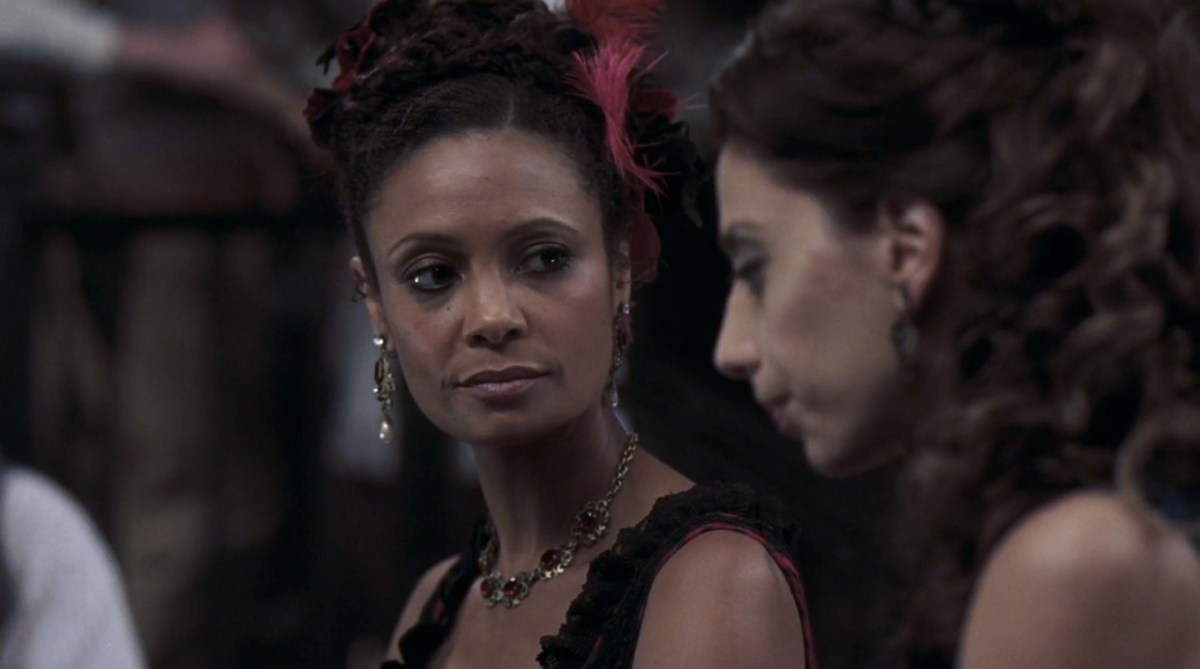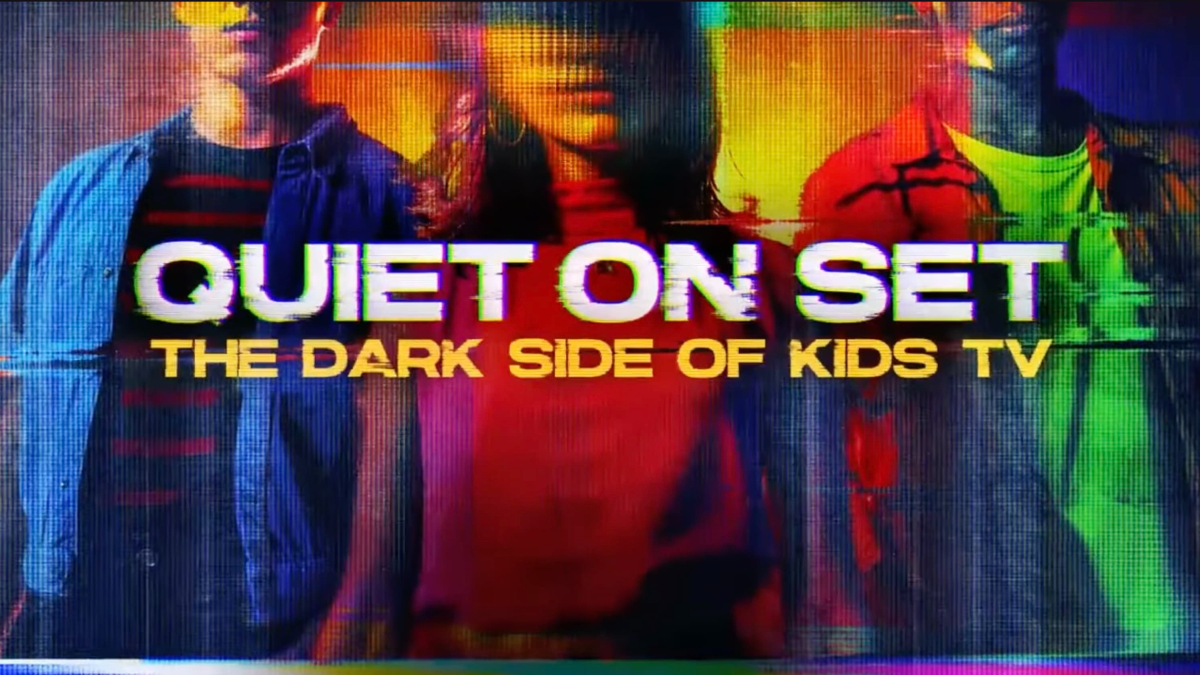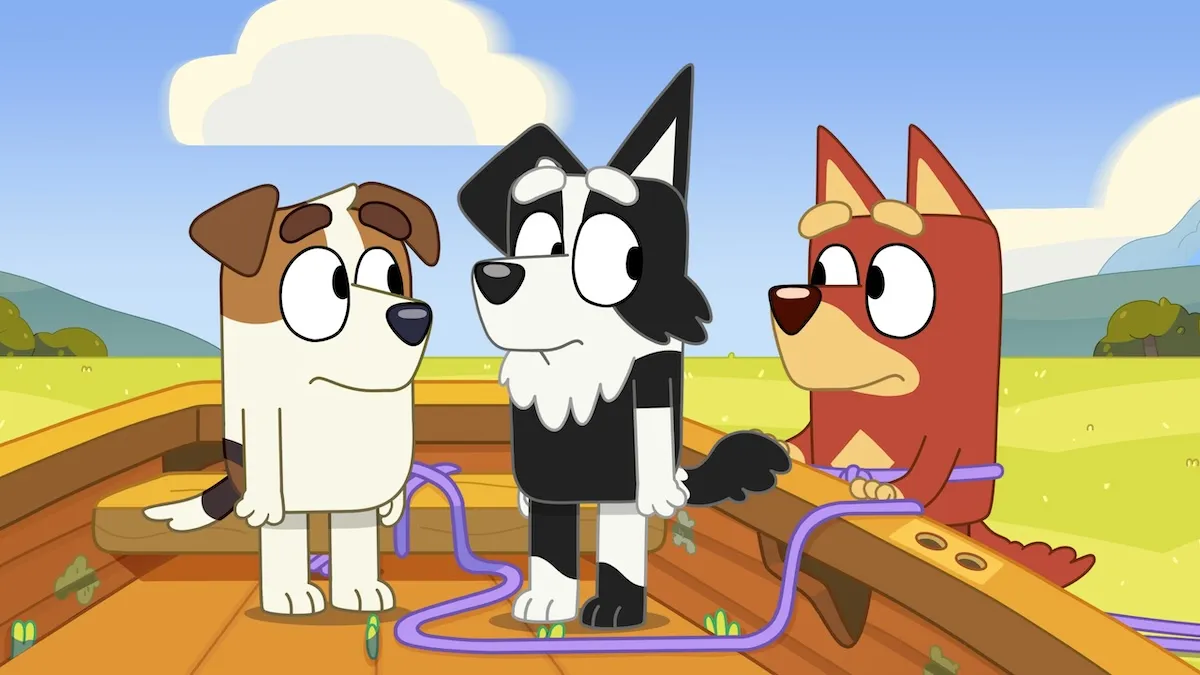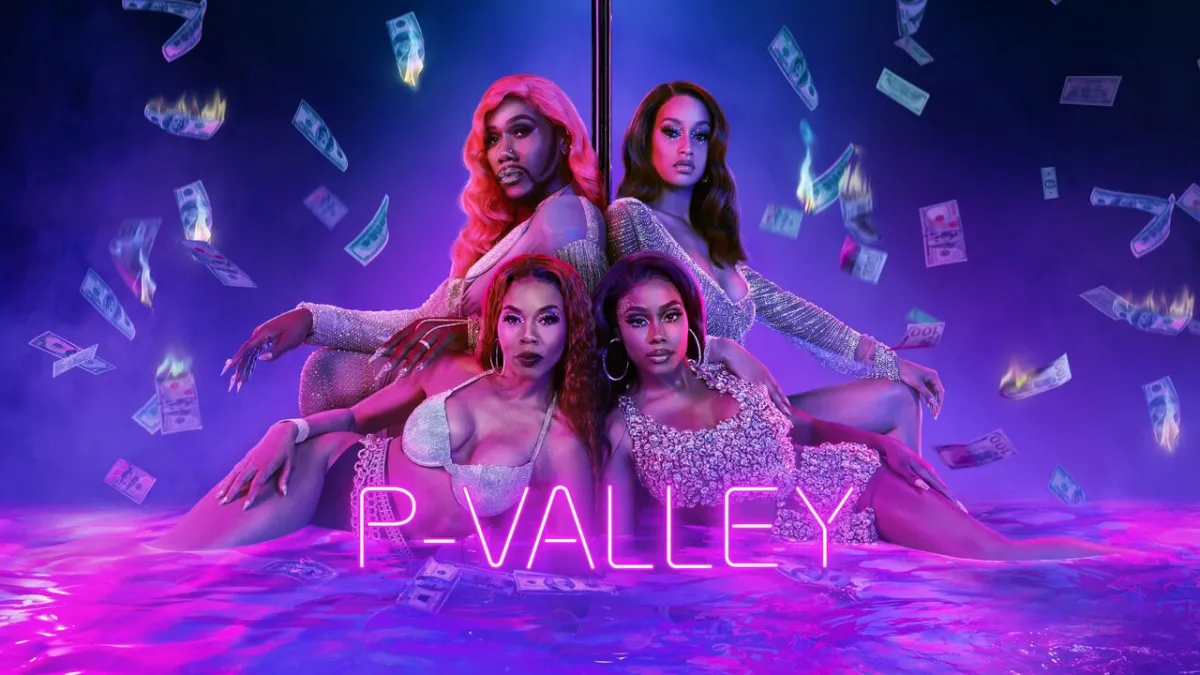Maddy and Teresa have both been watching HBO’s Westworld, which the network hopes will become “the next Game of Thrones.” The show is already shaping up to be about as controversial as Game of Thrones, even just among our own staff. Maddy watched the pilot episode and wasn’t a big fan, but Teresa has enjoyed the show so far. The two will be tag-teaming this recap and sharing their different takes on the show.
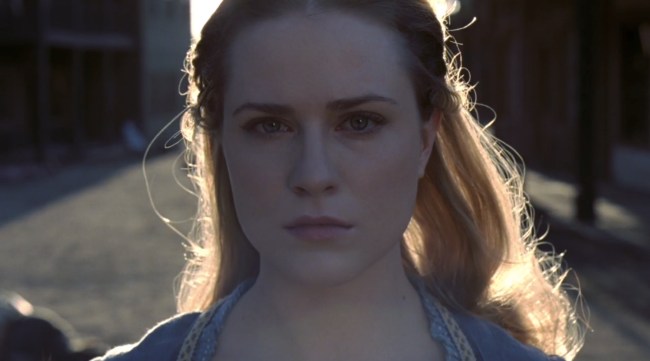
THE RECAP SECTION
Dolores wakes up to a man’s voice, which seems to only be in her head. It’s the middle of the night. She walks outside.
Two men sit in a high-speed futuristic bullet train to Westworld. As soon as they get off the train, several supermodel-hot people clad all in white greet them and welcome them to Westworld. One woman singles out the blond guy (who is named William) and says that since it’s his first visit, she has to ask him whether he has any medical conditions and, also, what type of experience he wants from Westworld. She brings him into a room full of Western guns and outfits–all tailored to fit him precisely. He asks if she’s a robot; she evades the question. When he wants to change his clothes, she offers to “help” him with that. He responds, “What do most people do?” In response, she starts unbuttoning his shirt and then reveals that she is indeed a “host” – meaning, a robot. She says all the hosts are “here for you, myself included.” He rebuffs her advances. (Teresa: It’s nice to see that not everyone who goes to Westworld is a raging sexual predator.)
Back at the robot creation station, programmers Elsie and Bernard have a conversation about what could have caused Dolores’ dad, Abernathy, to have his breakdown in the previous episode. Elsie wants to rebuild Abernathy. Bernard says, “You know the policy.” Elsie asks if she can check out any of the other robots who had interacted with him, like his daughter Dolores. Bernard says no.
On the streets of Westworld, Dolores is back in her powder-blue gown. She seems to be experiencing flashbacks to previous memories of shoot-outs that have happened in the town square. While Dolores is mid-flashback, Maeve interrupts and tells her to move along. In response, Dolores tells her the same eerie message that her father told her before he got taken out of service: “These violent delights have violent ends.” Maeve looks taken aback at first, but then her expression softens to concern.
Back to the shy blond guy, William, from the episode opening. His host invites him to select a cowboy hat. He chooses a white one. Next up: he enters a saloon, gets a brandy, and takes a drink. His gutsy brown-haired dude friend, who is named Logan, walks in, zipping up his pants. (Maddy: Are zippers accurate to the time period? Again, it’s never entirely clear which time period the Westworld theme park is meant to evoke; I still think historical accuracy isn’t necessarily the goal, so much as fantasy.) (Teresa: Meanwhile, I was just thinking, They have super-advanced AI…but guests can’t just fill out an internet form to make all these clothing choices in advance? Maddy: Westworld is all about the personal touch. Haha.)
Turns out Logan and William are not just in a saloon; this is the dining car aboard the train into Westworld. As the two men look out the window of the train, Logan gives William a “you have no idea” speech about Westworld, and how it’ll help him discover “who you really are.”
Back in Westworld, the robots are about to hang someone. The Man In Black shows up; we already know from the pilot that he wants to break “the game,” so of course he starts wreaking havoc here by trying to prevent the hanging. The Man in Black shoots every single person there except for the guy who is about to get hanged. As the pilot episode established, the robots are incapable of harming human visitors, even when they want to, so they can’t stop him.
The dude with the noose around his neck is named Lawrence. The Man In Black shows him the scalp he took from the Native American robot he tortured in the prior episode. The inside of the scalp has a mysterious symbol on it. The Man In Black tells Lawrence that the symbol is “the maze to the deepest level of this game. You’re gonna help me find the entrance.” The Man In Black ties Lawrence to the back of his horse and drags him along down the road.
Inside Maeve’s bar/brothel, we watch as she seduces a client. She tells him a story about her life, but in the midst of her reverie, she suddenly experiences a flashback to herself running through a field, looking scared. This flashback causes her to shut down and stop talking; the client excuses himself, baffled that his host seems to be broken.
Next up, we see Maeve in the nude, getting interrogated by her programmers. The guy evaluating her can’t figure out what caused the problem. “I’d fuck her,” he says. His female colleague says that Maeve’s been having trouble sealing the deal at work, and “if we can’t get her numbers back up, she’ll be decommissioned.” The two programmers decide to “up her aggression” with potential clients. (Teresa: I don’t understand why the programmers and engineers are so invested in particular hosts “doing well.” Are the folks who designed Maeve getting a commission every time a guest wants to sleep with her? If so, why does it matter so much? As long as the guests are there and having a good time, do they have to be fucking Maeve?)
Bernard goes to see Dr. Ford and tells him he’s having trouble getting over Abernathy getting decommissioned. But also, Bernard is worried about what could have caused Abernathy’s breakdown. Could it be sabotage? Dr. Ford manages to dodge that question with some high-minded statements about how what they do is so complicated, the most obvious explanation (sabotage) isn’t always the right one.
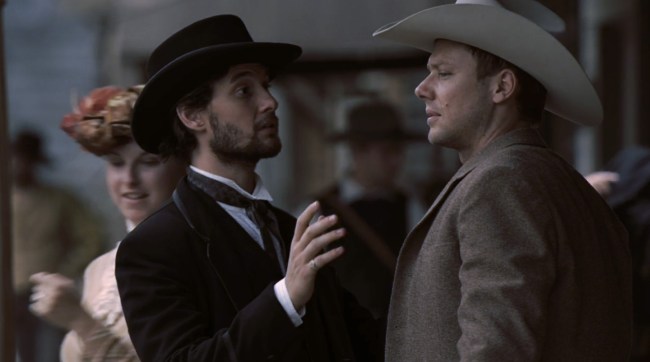
William and Logan are back in Westworld again. Logan starts openly antagonizing the hosts. Meanwhile, we see some Union soldiers trying to recruit people to fight on their side in the Civil War. (Maddy: Once again, the historical timing is odd here. Union troop recruitment suggests the 1860s, but zippers weren’t invented until 1893.) William keeps wanting to interact with the robots, but Logan doesn’t want to waste any time on talking to them or going on quests. (Teresa: William should totally take me to Westworld next time. I’m all about talking to the hosts and going on quests!)
Dolores shows up in the town square, as she does every day. When she catches a glimpse at herself in a shop window reflection, she starts flashing back to past memories again. Once again, she hears a man’s voice speaking to her, but this time, it’s revealed that the man is Bernard. She’s flashing back to a secret meeting she had with him. He appears to be trying to figure out who is behind the potential robot sabotage by questioning Dolores about whether anything unusual has happened to her lately. He then tells her to erase their conversation, but it doesn’t seem like that worked, since Dolores appears to have somehow remembered it.
Back in the brothel, Maeve is using her seductive wiles on a client again, and this time she gets all the way through her monologue without entering shutdown mode. But this client, who happens to be a woman, is put off by Maeve’s aggressive body language. She leaves, and Maeve loses another sale.
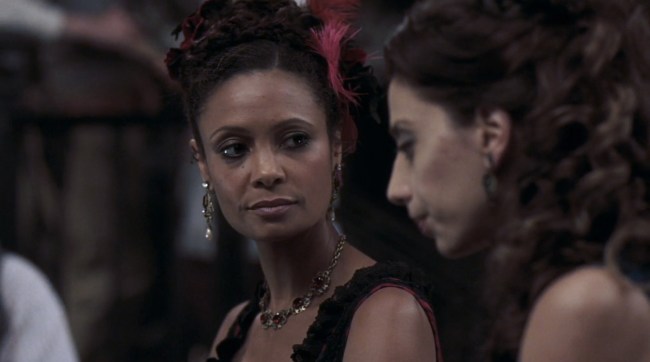
At the bar, Maeve and Clementine have a brief conversation about how Clementine hasn’t been sleeping well due to nightmares. Maeve tells her to just wake herself up next time she’s having a nightmare by counting backwards from three. After Clementine walks away, Maeve unexpectedly gets another flashback to a past memory. She gets interrupted by Teddy, who is apparently also standing at the bar; he sees her hand shaking and asks if she’s okay. She brushes him off.
A couple of programmers have noticed on the Westworld security cameras that Maeve isn’t acting like herself. They decide to swap her and Clementine’s roles and decommission Maeve in the morning. (Maddy: Programming question! Does swapping the roles cause every other robot’s internal programming to also update to reflect the change? Do all the robots now think that Clementine is the boss and Maeve is just an employee? How did they roll out such a comprehensive change so instantaneously? The future has REALLY good wi-fi.)
Bernard runs into Theresa Cullen, who can’t manage to get her cigarette lit.Bernard lies to her face and tells her, “all the hosts are back to normal.” (Maddy: People still smoke old school cigarettes in the future? Teresa: I don’t know that this is the “future” so much as an alternate present where someone came up with this fancy tech. We’ve yet to see the “outside world,” so we don’t really know. Maddy: It could be an intentional signal–a sign that she rejects the technology around her, and enjoys the sentimentality of a classic cigarette. By the way, it’s been a long time since I saw a character on a TV show smoke a cigarette. It happens on Mad Men, but on a futuristic sci-fi show like this? Surprising choice.)
William and Logan are sharing a meal together. Logan keeps trying to make trouble and threatens to shoot the robots around them. William tells him to at least wait until they’re done eating. One of the robots that William met earlier in the episode comes up to them to try to get them to join one of the Westworld quest-lines. Logan stabs the robot in the hand, then drags his horrified friend out the door.
While Logan hooks up with three hosts at the brothel, William sits in the other room dusting his hat. Clementine walks up to him and starts coming onto him. He says no, then says, “I have somebody—somebody real—waiting at home.” She says, “I understand. Real love is always worth waiting for.”
Meanwhile, Lee Sizemore is throwing a tantrum because one of the new robot models has a nose that is too big. It’s not just any tantrum—it’s a screaming, throwing-objects tantrum. Theresa Cullen shows up and interrupts Lee to tell him that she received his request to retire 50 hosts; apparently he wants to remove a bunch of old models, and put in a new storyline about a “horde” of “savages.” Theresa asks if Dr. Ford approved of that storyline, and Lee shoots back that Dr. Ford hasn’t weighed in on storylines for years.
Meanwhile, Dr. Ford puts on some Western attire and rides a glass elevator (Maddy: sorta like Willy Wonka!) up to Westworld. Dr. Ford meets a young boy out in the desert and they have a cute conversation about the nature of boredom.
The Man In Black has taken Lawrence to a sparsely populated little town that we haven’t seen yet before. Apparently, Lawrence has a family there that he never sees anymore. The Man In Black is delighted to have discovered this, calling it another one of Westworld’s “secrets”–evidence of why Westworld is “better than the real world,” which is just “chaos” that lacks the designed narrative of Westworld.
The Man In Black won’t let up on the maze thing, even though Lawrence says he doesn’t know anything about it. In order to intimidate Lawrence, the Man in Black shoots the bartender—right in front of Lawrence’s wife and young child.
Meanwhile, one of the programmers points out the Man In Black’s actions, asking if it’s okay that he’s been disrupting so many storylines. “That gentleman gets whatever he wants,” is the response from another programmer.
Back in Westworld, the Man In Black says he’s been “coming here for 30 years. In a sense, I was born here.” Then he kills all of Lawrence’s friends in front of him, culminating the scene by killing Lawrence’s wife. Suddenly, Lawrence’s daughter looks strangely calm and tells the Man In Black what he wants to know. First, she says, “The maze isn’t meant for you.” But then she does tell him how to get to it. The Man In Black decides not to kill this young girl, since she did help him. He instead leaves her alive, ties her dad to his horse again, and leads Lawrence away from his home.
Dr. Ford and the young boy continue to explore the desert together. They run into a rattlesnake, which is also a robotic snake, and Dr. Ford charms it out of attacking them. The boy is fascinated by the “magic” of Dr. Ford charming the snake, who says, “everything is magic, except to the magician.” Dr. Ford commands him to leave; the boy robotically turns around and retreats as he was told.
Theresa Cullen shows up at Bernard’s house. Apparently they’re an item? They start making out, then move to the bedroom. Post-coitally, Theresa moves as if to leave. Bernard tells her to stay longer so they can talk. She complies, but they just talk about work. She asks him why the robots talk so much to each other, when human tourists aren’t around. Bernard says they’re “practicing.”
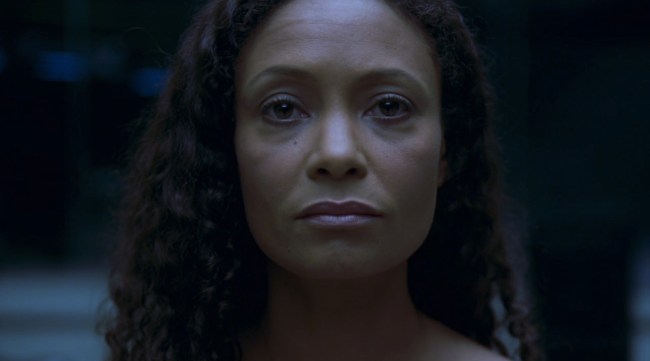
Time for Maeve’s exit interrogation before getting decommissioned… except Elsie doesn’t want to decommission Maeve at all. She decides to turn down Maeve’s “aggression” and instead turn up her social perception. The other programmer in the room asks Elsie if the robots dream. After all, Clementine and Maeve were talking earlier about nightmares. Elsie says no, the robots don’t have dreams, nor do they have memories. The only reason they know about “the concept of dreams” at all is in case the robots accidentally do log memories of things they shouldn’t remember, like experiences of getting repaired in the body shop. But, really, the robots shouldn’t be logging any of that; it’s just a failsafe in case anyone forgets to wipe their logs.
Reinstated back in the brothel, Maeve gives her monologue to another potential client. This time, she nails it, and the client heads happily upstairs with Clementine. Teddy strikes up a conversation with Maeve once again. Just as in the pilot, Teddy is judgmental towards Maeve about her life choices and line of work, and she’s delightfully snarky in response. (Maddy: Why does Teddy keep coming to this bar/brothel, anyway, if he doesn’t approve of the business they run there? Is there something going on between him and Maeve? Hmmm.) Suddenly, a visitor shoots Teddy a whole bunch of times, seemingly for no reason. Ah, humans!
Upstairs that night, Maeve starts changing out of her clothes and she experiences yet another flashback. It passes and she gets in bed and goes to sleep. After she closes her eyes, the flashback comes back. So, robots DO have dreams!
In Maeve’s dream, which seems to be a flashback to a different storyline that unfolded within Westworld, she lives in a farmhouse and has a young daughter. She gets kidnapped and restrained by a Native American who tries to scalp her, then she’s saved by a nearby horseman who looks like the Man In Black. The Native Americans shoot him with an arrow and he falls to the ground. She runs through the field, taking her daughter’s hand, trying to escape from her attackers. She makes it inside the house and grabs a shotgun, but her house has been surrounded. Suddenly, the Man In Black walks in her front door. She tries to shoot him, but her bullets don’t work on him. He grins and pulls out a knife. She does the trick that she told Clementine about earlier in the episode: she counts down from three, and wakes herself up from the nightmare.
Except… she’s not safe at home in bed, she’s on an operating table getting a repair from the robot builders. They realize she’s awake, but it’s already too late. She rises, unsteady, from the table and clutches her surgical wound. She grabs a scalpel and tries to threaten her surgeons. They try to get her to calm down, but it doesn’t work. She backs out of the room, then makes a run for it, clutching her wound all the while.
As soon as Maeve exits the room, she sees lots of other disturbing images—other naked robot host bodies, more operating rooms. In shock, she falls to the ground. At that point, her two operators catch up to her and put her back into sleep mode. (Maddy: Interestingly, they inject her with something in order to achieve this, as opposed to using a vocal command like usually happens with the robots on this show.) As Maeve passes out again, the camera shows us that Teddy was one of the lifeless host bodies getting his bloody wounds hosed off.
Meanwhile, Dolores wakes up in the middle of the night again. She walks out of her house, reaches a specific spot, says “here,” starts digging, and finds a gun. Spooky.
Lee unfolds his presentation for his new narrative arc. It’s called “Odyssey on Red River,” and it sounds pretty by-the-books and stereotypical as far as Western adventures go: the guests fight against “braves,” rescue “maidens,” have an ill-fated sidekick, and so on. Dr. Ford watches the presentation, then says a single word: “No.” Lee is gobsmacked by the rejection. Dr. Ford elaborates, “The guests don’t return for the obvious things we do, the garish things. They come back because of the subtleties. The details.”
Back in Westworld, Dr. Ford and Bernard hike through the outskirts of the desert together–the same mysterious place that Dr. Ford explored with the young boy robot earlier in the episode. Bernard points out that their bosses might be upset that Westworld isn’t launching a new storyline. Dr. Ford responds that he is planning to launch a new one, which he’s “been working on for some time. Something quite original.” The camera pans out to reveal a black metal tower that we saw in the distance when Dr. Ford and the young boy were talking to one another; the tower has a cross on top of it, and it looks foreboding.
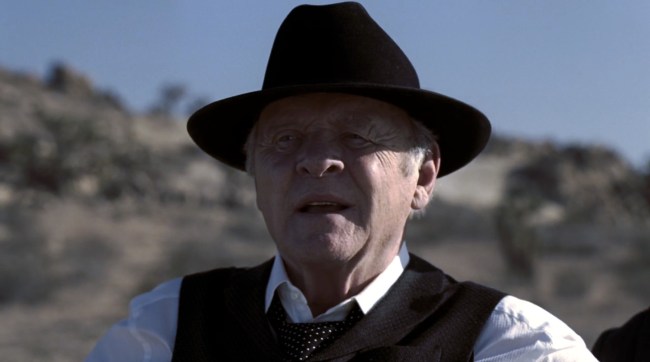
THE OPINION SECTION
Maddy: I liked this episode more than the pilot, which is what I expected, especially after seeing so many critics say that Westworld gets stronger as it goes along. I was also relieved, because the pilot disappointed me so much that it was nice to actually watch something I enjoyed. One of the big issues I had with the pilot was that the actors–particularly the programmers, not the actors playing the robots–didn’t seem to have enough chemistry with one another. The conversations between Theresa, Bernard, Elsie, and the other programmers in the first episode felt very stilted and awkward to me, and even Dr. Ford’s lines felt overwritten to me at times (not that Anthony Hopkins didn’t do his damnedest to sell them). In this episode, I felt like Elsie and Bernard and Theresa all seemed more natural–more like longtime colleagues, as opposed to total strangers. The fact that it’s been revealed that Bernard and Theresa are dating is interesting too; it retroactively explains their awkwardness towards one another at work.
I already thought all the robot actors were nailing their roles in the pilot, and I still think so here. Mostly, this episode elaborated on what the pilot episode already established, and there was some repetition; the storyline about Logan and William visiting Westworld was the least interesting to me, since it felt like a rehash of what has already been established about the world and why tourists enjoy the place.
The Man In Black storyline advanced a bit more in this episode, and his motivations got explained beyond just the fact that he’s trying to break “the game.” Now, it seems more like it’s going to be a battle of the minds between The Man In Black and Dr. Ford, as the former attempts to unravel the designs of the latter. In the previous episode, it felt like the Man In Black was just being cruel to the robots for the sake of testing their limits, and it was hard for me to watch (I realize this type of scene is “supposed” to make the viewer uncomfortable, but that’s just not the kind of TV I enjoy). In this episode, I felt like the Man In Black’s actions made more sense; when he was torturing robots, it was clear what he was trying to achieve, and that helped.
In the prior episode, it seemed more like the dehumanization of the robots was just for the sake of shock value.
This episode made some compelling strides in changing the tone of the robot-in-distress scenes, at least in my opinion. As one example, I thought it was interesting that Dolores was still wearing her dress during the secret conversation that she has with Bernard. I think the reason why the robots are naked while they’re in the body shop is because the programmers are trying to force themselves not to see the robots as human. So, the programmers have to constantly work to dehumanize the robots (calling them “that thing,” interrogating them in the nude, hosing them down like they are vehicles in a car wash, etc). Bernard, however, is starting to feel some sympathy for the robots; we see him get emotionally crushed by Abernathy’s decommission, and also, the fact that Dolores gets to keep her clothes on during the secret conversation felt like a visual cue that he is seeing her as a person, as opposed to just a machine. You could also argue that he was just in a hurry because their interrogation was happening in secret, but I still think it’s worth pointing out, since I believe that’s been the only interrogation scene we’ve seen so far with a robot where the robot wasn’t naked.
That said, I still think this show asks a lot of the viewer’s comfort, since the entire premise revolves around sexual violence and disturbing imagery. I’ve had a lot of therapy at this point in my life, so I’m able to watch these types of shows without it bothering me, but the first episode was still really a trial for me. This show still revolves around non-consensual sex work and still features some significant distress and torture scenes as a result. The robots are, as I’ve said, the heroes of the show and we’re invited to sympathize with them, which is the main aspect of the show that I enjoy… but it’s also undeniably difficult to watch. I realize that discomfort is there “on purpose,” but it means that if I were to recommend this show, I’d have to do so with a lot of caveats.
I still think this episode was a lot more compelling to watch and less “in your face” with the rape and torture than the pilot episode; the episode felt more balanced, and the actors coming more into their own helped a lot too with my overall enjoyment. I’m still frustrated with the framing of the show, and I have some concerns about how Westworld will navigate the concept of consent going forward, but I’m more hopeful now, having seen the second episode.
One major difference, I think, is that this episode revolved a lot more around Maeve, who was perhaps my favorite character in the pilot and continues to be a standout on the show for me. It’s not that Evan Rachel Wood and James Marsden aren’t also killing it as their robot characters, I just really love Thandie Newton’s performance–and I think the fact that she’s a sex worker both inside the frame story of Westworld and as her robot self could shape up to be an interesting commentary, as she becomes more self-aware.
I’m not wild about the Virgin/Whore dichotomy we’re seeing between Maeve and Dolores, but I’m hopeful that the two of them are going to shake things up in future episodes and become friends–and that we’ll have more female characters (perhaps some older women?) getting to represent the whole spectrum of human experience. That said, though, I get that this is a theme park that revolves around sex work, so … I guess it makes sense that “girl next door” and “brothel employees” are the two options given to female characters, since the storylines on Westworld still seem to operate on the same stereotypes as video games do nowadays.
Speaking of which, Lee Sizemore is an amazing commentary on video game designers. I cited his characterization as one of my favorite aspects of the pilot, and that’s still the case. Excited to see episode 3!
Teresa: While I agree with Maddy that, yes, lots of the Westworld pilot was difficult to watch, I was also impressed with how the show managed to tackle a lot of those difficult things in as non-exploitative a way as such things can be portrayed. Yes, the hosts are interrogated naked, but we rarely see full-frontal nudity. Usually, when the hosts are being interrogated, we see them from the shoulders up, and camera shots don’t linger on their bodies too much. We know Dolores is sexually assaulted by The Man in Black in the pilot, but we aren’t subjected to watching it. Even the violence isn’t particularly bloody; certainly not to the extent that Game of Thrones is. All of the savagery of the guests and the callousness of the programmers toward the hosts is either visually implied, or made clear through dialogue. To paraphrase Executive Producer, J.J. Abrams from an interview about the show, “You can’t tell a story about the oppressed without showing the oppression.” Westworld strikes a great balance in this way.
That balance continued in “Chestnut,” where we only catch a glimpse of Maeve’s breasts in the least sexualized context possible: when she’s lying on a slab being cut open, and is then running for her life. We see host bodies piled up and getting hosed off, but we see this from Maeve’s point of view, from a distance, in a very matter-of-fact way. One of the great things about this show is that it implies more than it shows, but in doing so, the emotional impact is greater, and so we feel as though we’ve seen more than we have, and we get sick to our stomachs. We should be sick to our stomachs. And yet, we live in a world with a history that includes actual, non-AI black people having been put in zoos as exhibits, not to mention plain old sexual slavery not in an entertainment context. So we’re sick to our stomachs, not just because of what we see on the show, but because we know just how possible these scenarios actually are. We don’t need a sci-fi story to know that, deep-down.
I was glad to finally see a guest intake in this episode, to actually see what someone going to Westworld experiences. I was also thrilled that not everyone who goes to Westworld is a raging asshole. Though I have to wonder, why and how the hell are William and Logan friends in the first place? In any case, I really wanted to see someone like William, because (and call me a Pollyanna) I can’t imagine that everyone who can afford a trip to Westworld is a horrible human being. “Fantasy” does not mean “abuse” to everyone, and I hope that we continue to see guests at Westworld who are there for reasons having nothing to do with rape and murder. This doesn’t have to take away from the fact that the hosts are mistreated. In fact, it would almost make it worse. After all, racism and sexism aren’t just about the blatant abuses, they’re about the microagressions. We already saw a little of that, when that little boy tells Dolores “You’re one of them. You’re not real!” in the pilot. I’d like to see how “nice people” interact with the hosts of Westworld more.
I love that there was so much more focus on Maeve this week, and I’m really looking forward to a moment when she and Dolores team up and take all of this down (maybe Teddy can help, although I’m not sure he has it in him). Each of their stories is fascinating, and all of their performances are gorgeous to watch.
Likewise Anthony Hopkins and Jeffrey Wright as Dr. Ford and Bernard. Their differing struggles with their consciences are fascinating. Bernard seems like he might be secretly sabotaging the park through Dolores, in an effort to be on the hosts’ side. Whereas Dr. Ford seems really invested in their personhood within the park. The secret project he’s working on involves a church that’s he’s building. Will we be exploring host spirituality? Abernathy already told Dr. Ford that he wanted to “meet his maker.” We assume that he meant that literally, but what if Dr. Ford wants to explore that concept with them in a more spiritual sense. Does Ford actually want to be God?
Different people have their favorite parts of Westworld. I got super-bored whenever the pilot focused on the programmers and on the corporate side of Westworld. And yet in this second ep, I found myself intrigued by Elsie. She seems really into making out with the female hosts, and I have to wonder if she indulges in Westworld herself. This is interesting both from an LGBTQIA representation standpoint, and also from a consent standpoint. So far on the show, we’ve seen men being predatory, but women are just “having fun” when they have sex with hosts. However, women are just as capable of being predatory and horrible, and I’m curious about how that might be explored. Maybe through Elsie, but maybe not. Maybe we’ll see a future episode in which a woman gets really predatory with Teddy. There are so many more nuances and colors to be explored here, and I think that Westworld is proving itself up to the task.
Want more stories like this? Become a subscriber and support the site!
—The Mary Sue has a strict comment policy that forbids, but is not limited to, personal insults toward anyone, hate speech, and trolling.—
Follow The Mary Sue on Twitter, Facebook, Tumblr, Pinterest, & Google+.



